Great Britain
English Port Cities: ° Bristol ° Chester ° Dartmouth ° Falmouth ° Gravesend ° Harwich ° Hull Docks: Bessemer Steamer ° Liverpool ° London (Billingsgate) ° Newcastle-Upon-Tyne ° Plymouth ° Southampton ° Portsmouth ° Weymouth ° Woolwich (The Hulks)
Crown Dependency of the United Kingdom (Crown Colonys): ° The Channel Islands ° Cornwall ° Isle of Man ° Isle of Wight
Liverpool
Liverpool started as a small fishing community on the banks of the River Mersey; due to trade, including emigration, to North America, the city grew.
Liverpool began her place in world history when, in 1207, King John granted the town its market charter, then in 1282 a group of monks from Birkenhead Priory established the very first ferry service across the Mersey.
Nevertheless, it wasn't until the industrial revolution in the 18th century that her prime position on the West coast of England became readily apparent and Liverpool quickly established itself as an important trading port.
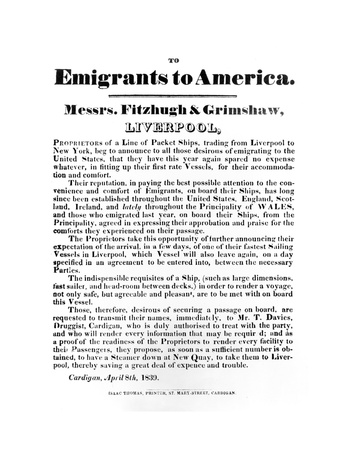 |
| Advertisment for Packet Ships to America. 1839 |
New York Tribune, June 17, 1854, New York, New York, U.S.A.
Treatment of Emigrants from Liverpool
Liverpool, England. 1836.

A Liverpool correspondent of the American, and Foreign Emigrant Society of this City gives the following account of the condition and treatment of emigrants in that port:
Of all the crowds who throng our port seeking a passage across the Atlantic, none are so destitute and helpless, or are so cruelly treated, as those who.orge with passage certificates in their hands, purchased and sent them by their friends in America.
The majority are females and children, following their husbands, parents or other relatives to the land of promise. They arrive with a few shillings in their pockets sometimes, perhaps, money to pay traveling expenses from the American sea-port to their new homes in the interior of the country. This, if known, is filched from the merciless harpies with whom they have to do. As there is no commission to be got for booking these passengers, all that the runners can get by them is by inducing them to lay out the few shillings they have at shops to which they take them, where everything is sold at on extravagant rate, the runners sharing the overcharge. From fifteen to twenty per cent, is usually paid by even first-class dealers on sales thus effected.
Yorkshire Packet Ship to America.

The keepers of lodging houses next come in for their share of the pitiful spoils. A set of perfectly devetized men, who drag the poor creatures into small collars, filthy, damp, dark dens, where they are detained sometimes a week or ten days, if it does not suit the purpose of these wretches to get them on board ship sooner. Thence they are hurried on board, fleeced of eyery penny, without the means often of buying a bundle of fresh straw for their beds. Can we wonder that disease and death should seize them on the passage? That more do not die would appear a miracle.
It can only be explained by reference to the remarkable stamina and power of endurance which these poor people possess. Such is the lot of thousands of emigrants as I can testify from personal knowledge, and as every one will testify who has the same opportunity of observation. I have spoken of the frequent detention of these prepaid passengers. This, perhaps, requires explanation, and is a further illustration of the wrongs which these poor people suffer. The ship-passenger brokers are accustomed to charter the whole of the between decks, the berths of the prepaid passengers excepted.
British Emigrant Ship Leaving for Australia. 1844.

It is true that the law requires that one shilling per day "detention money" shall be paid to each passenger so detained, but the claimants are often defrauded of this by being hurried on board ship with the assurance that the captain will pay them after they got to sea. Of course, the captain when applied to, knows nothing about it. Complaint may be made to the owner or consignee, when the ship reaches port, but the reply is, we know nothing about it, but we will write to our agent.
The remedy that I have heard proposed, and that strikes me as feasible, and which I hope your Society will assist to carry out, is for the shipowners to erect a suitable lodging house, where persons waiting embarkation may have. comfortable and economical accommodations.

If emigrants in port are numerous, enabling the brokers to put up the price of passage, and fill the ship with pay-passengers, the prepaid passengers who.orge with certifcates in their hands are kept back, the berths in the ship to which they are entitled by prepayment being given to others who pay the broker's prices.
In connection with it, a shop where shipstores may be sold at a reasonable rate. It is thought that an addition of one dollar for prepaid passage tickets would defray the expense of the erection and maintenance of this lodging-house.
At any rate, let something be done; as it is, humanity is disgraced.
June 3, 1859, The Daily London Journal
At the Birkenhead police-court this day, Patrick Fallon, a painter, James Maguire, Thomas Murphy, Lawrence Taggart, and Thomas Martin, young men, navvies, surrendered on bail, the first charged with having assaulted some of the men at Mr. Laird's shipbuilding yard, created a riot, and broken windows, and the others with having unlawfully combined to rescue him when in charge of the police. Mr. Bretherton appeared on behalf of the prisoners, On the bench were the Rev. R. M. Fielden, Sir Edward Oust, and Messrs. E. Bryans, Potter, and J. B. Case. A large crowd was collected outside the hall, and though much interest played there was no ebullition of feeling. A company of the Kerry Militia, under Capt Herbert, who arrived Chester on the Tuesday evening, was stationed in a portion of the hall, and a number were on duty before the court up to one o'clock yesterday afternoon.
Inspector Strangward, described the excited state of feeling that prevailed throughout the township on the occasion, of polling, as to whether there should be a burial board for a new cemetery, as proposed by Mr. Craven, or whether the whole subject should be placed in the hands of the Commissioners, as proposed by Mr, Laird at the vesting meeting, when the poll was demanded. At half past ten o'clock on Tuesday morning about 2000 men were coming towards the Town-hall, where the polling was going on, armed with sticks, spades, and other weapons. They appeared much excited, and to be under some ringleaders. They were met by the Rev. Canon Chapman, Roman Catholic priest, who took a great many of their sticks from them, and they dispersed without committing any violence. At half past two, a message arrived at the Town hall that a mob was attacking Mr. Laird's shipbuilding yard. He went down with some policemen, and saw a large crowd collected opposite the works. They were excited and were talking. He saw that a number of the windows had been broken. The prisoner Fallon was in custody inside the gates, and he was handed over to the police, who removed him to Bridewell. A mob of about 2000 followed, and the other prisoners were active in trying to rescue Fallon from the police. They did not strike or abuse the officers. They were all lodged in Bridewell.
In reply to Mr. Bretherton, he said he did not see the voters interfered with. He saw an omnibus going about with a band of music, but he could say it was for Mr. Laird's party, or that the band played party tunes.
George Bridge, an operative at Mr. Laird's yard, said a woman in the crowd was the first he saw throw stones. Fallon was also active but he was not the ringleader. He heard the mob shout, but could not say what their object was. They broke the front windows, and thousands of stones were thrown. One of the crowd forced in a side door..
Cross-examined by Mr. Bretherton. Was not aware that Mr. Laird's men made a charge upon the crowd before the stone throwing. James Cross, a plumber, saw the crowds several times during the day. About two o'clock he followed them from the Town-hall to Mr. Laird's yard. Women were screaming, and men shouting and cursing. They said they would kill every one who had voted for Mr. Laird. This was the purport of what they were shouting. He saw Fallon throw stones.
Cross-examined by Mr. Bretherton, Mr. Laird's men threw some pieces of wood at the crowd. He saw, afterwards, in Mr. Laird's yard that the men were armed with pikes, and had four 14-pound guns, but it was only to frighten the mob.
Departure of the Emigrant Ship Lizzie Webber. 1852.

Other witnesses gave similar testimony. Mr. Bretherton, on behalf of the prisoners, urged that the whole circumstance clearly showed the supremacy of the law, for out of 80,000 people in Birkenhead, there was not a man who could say he was hurt, and they would find that more women and sick people voted on the day in question than on the preceding day. With regard to the prisoners having been let out gaol, it was only after good and substantial bail was tendered by the Rev. Canon Chapman, and it was an Englishman's right to be set at liberty in such cases when bail was tendered. The worthy father (Chapman) had merely gone home to get a glass of wine, having exerted himself all day to preserve the peace, when the mob slipped down to Mr. Laird's place. It was a mere misfortune of the day.
Mr. Bryans, J. P., said he was glad Mr. Bretherton had alluded to the prominent feature or this case, the prisoners having been liberated on bail. The Rev. Canon Chapman came to him as the only magistrate present, and said he would offer any bail he was pleased to mention. He took bail, and the law was vindicated in every way it could be, the men having a right to their liberation on bail being given..
Mr. Bretherton dwelt on the comparative absence of crime amongst the navvies, " the Papists," at Birkenhead, and admitting that the prisoners had done wrong, he pleaded for mercy. The magistrates consulted together for some time, when Fallon was committed for trial at the assizes; the other prisoners were bound over to keep the peace for two months.
Steam-Ferry Crossing the Mersey

By the middle of the 18th century Liverpool was at the center of a thriving trade triangle between England, Africa and the Americas.
Goods such as textiles, hardware and weaponry were shipped to America where they were traded for African slaves. The slaves were then transported to the Americas where they were exchanged for new-world luxuries such as tobacco and sugar. The laden ships would then return to Liverpool. Under this triangle of trade the city soon prospered and rapid expansion took place. Liverpool's wealthier citizens began to build elegant town houses for themselves and stunning civic buildings for the city.
AMAZING GRACE IN JOHN NEWTON
William E. Phipps. Mercer University Press
John Newton's allusions to the drama of his life tell the story of a youth who was a slave in Sierra Leone before ironically becoming a slave trader himself. Liverpool, his home port, was the center of the most colossal, lucrative, and inhumane slave trade the world has ever known. A gradual spiritual awakening transformed Newton into an ardent evangelist and antislavery activist. Influenced by Methodists George Whitefield and John Wesley, Newton became prominent among those favoring a Methodist-style revival in the Church of England. While pastor of a poor flock in Olney, he and poet William Cowper produced a hymnal containing such perennial favorites as "Glorious Things of Thee Are Spoken" and "God Moves in a Mysterious Way." Later, while serving a church in London, Newton raised British consciousness on the immorality of the slave trade.
Mail Packet off Liverpool. Robert Salmon.

The account he gave to Parliament of the atrocities he had witnessed helped William Wilberforce obtain legislation to abolish the slave trade in England. Newton's life story convinced many who are "found" after being "lost" to sing Gospel hymns as they lobbied for civil rights legislation. His close involvement with both capitalism and evangelicalism, the main economic and religious forces of his era, provide a fascinating case study of the relationship of Christians to their social environment.
In an afterword on Newtonian Christianity, Phipps explains Newton's critique of Karl Marx's thesis that religious ideals are always the effect of what produces the most profit. Phipps relies on accounts Newton gives in his ship journal, diary, letters, and sermons for this most readable scholarly narrative.
New York Daily-Times , December 7, 1853, New York, New York
The Cotton Trade
Per Europa LIVERPOOL, Friday, November 18.
The accounts received from America on Monday appeared to confirm the occurrences of a severe frost in Georgia and Alabama, if not on 24th, at all events about the 31st of last month but in consequence chiefly of the greatly diminished consumption of cotton in this country at the present moment, have failed to produce any animation in our market which closes steadily, with a moderate amount of business doing, at the prices of this day week. Money, as transactions become contracted grows easier notwithstanding the low rates to which the Continent Exchanges have again fallen, and (word?: Consols?) are steady at about 95, in the face of accounts from the seat of war, which would appear to leave no hope of peace being reestablished for the present.Yorkshire Packet Ship

The Manchester market is very dull, the demand hardly keeping pace with the diminished quantity of goods and yarns now produced. There is still no immediate prospect of the masters and operatives coming to terms in the districts in which the threats have taken place. The sales of the week are 37,350 of which 6,000 bales are for Speculation and for Export, leaving 31,350 in the Trade. The market today is steady. Sales 6,000 bales. The stock, 655, 128 bales, of which 359,889 American, against 421,805 bales last year, 212,143 American. We quote Fair Orleans 6-1/2d, Middhug do 6d, Fair Mobiles 6-2/1d, Middling do 5-1/2d,
.
By the start of the 19th century slavery had been abolished in Britain, however Liverpool continued to be a significant world port - but this time it was used for emigration. In the hundred years from 1830 to 1930 some nine million people left Liverpool's docks bound for the New World. The move towards large-scale scientific farming greatly increased output but made many agricultural workers redundant. Some moved to the fast-growing industrial areas in search of work, whereas others decided to emigrate to Australia, New Zealand, Canada, South Africa and the United States.
Wreck of a Transport Ship. William Turner.

After 1830 the numbers of people leaving Britain increased dramatically. This was particularly true of those farmers and laborers who had lived in counties that had been hardest hit by the agricultural depression such as Kent, Sussex, Hampshire, Dorset, Cornwall, Yorkshire, Derbyshire, Cheshire and Cumberland. Liverpool now became the most popular emigrant port in Europe. In 1830 around 15,000 people sailed from this port to North America. By 1842 this had reached 200,000, which accounted for more than a half of all emigrants leaving from Europe. This emigration has a dramatic effect on Liverpool's population in that many people who intended to travel "through" Liverpool for the New World settled in Liverpool. Immigrants from every part of Europe immediately gave the city an international feel, and whole ethnic communities were soon established in the city.
Saloon Passengers Landing from SS Majestic.

The ethnicity of Liverpool changed again after the 1845 potato famine when huge numbers of Irish immigrants arrived, followed by a huge influx of Caribbean, Chinese and Indian immigrants in the late 19th century.
March 8, 1854, New York Daily-Times , New York, New York, U.S.A.
COMMERCIAL INTELLIGENCE
Liverpool Cotton Market.
The Fishery. Richard Wright. c. 1764.

The improved demand last noticed has continued, and the prices current for America are perhaps 1-16d dearer—other qualities are unchanged. The week's sales foot up 69,600 bales, (of which 40,000 were American,) including 20,800 on speculation, and 3,440 for export. Today (Friday) the sale were 8,000 bales with a firm market. The authorized quotations, which are as follows, show no change,—but some Brokers quote 11-6d quid dearer than these. Fair Orleans, 6-1/2d, Middling, 5 15-16d. Fair Mobile, 6-1/2 d, Middling, 51/2d, Fair Uplands, 6-1/2d., Middling, 5-1/2d.
Liverpool Breadstuff's Market
FLOUR closes steady at 6d decline on the week.
WHEAT active at former quotations Indian Corn is low and but little inquired form. DENNISTOUN & Co. quote as follows: Western Canal Flour, 40s and 40s. Baltimore and Philadelphia, 40s 6d . . . United States White Wheat, Red and Mixed, 11s 9d @12s. White Corn, 46s @48s. Yellow and Mixed, 45s 6d @ 47s.
Liverpool Provision Markets
Beef in brisk demand at full prices, some holders asking an advance for new and old Pork, though not entire, is steady, and the stock being light, holders are not pressing. BACON moved freely and the market closed firm. CHEESE-A fair inquiry at full rates. LARD-Small sales have realized 37s 6d @58s, but two tons for Spring delivery sold at 55s 8d. TALLOW loss active-Y C 64s. LINSEED CAKES dull.
|
Emigration to America, 1860 Antonie Volkmar (1827 Berlin - 1867 Berlin) Volkmar was a pupil of Julius Schrader in Berlin (1848) and Louis Coigniet in Paris (1853/57). She was active in Berlin, and in 1862/64 lived in Italy. Volkmar was the first teacher of famous artist Max Liebermann. |
January 9, 1885, Iron, London, Middlesex, Great Britain.
Boarding an Emigrant Ship in Driving Rain.
Liverpool.
1870s.
MERSEY. As compared w
August 31, 1869, Commercial Daily List
AFRICAN STEAM SHIP COMPANY.
(Incorporated by Roy a
Charter,) 14, Leadenhall Street London, 15th June
1866.
NOTICE is hereby given that the Directors of this Company purpose establishing a bimonthly line of Steamers to run from Liverpool in conjunction with the Mail Packets, commencing on the 10th of October next.
The Vessels composing this additional line being under no postal restrictions, will call at all Ports of the West Coast of Africa, for which sufficient inducement offers. As a rule, however, the following Ports which the monthly Mail Steamers visit, will not called at by the extra Steamers, viz BATHURST, MONROVIA, C. C. CASTLE, JELLAH COFFEE, BENIN, and OLD CALABAR. TENERIFFE will be called at on the home Voyages only. Rates of Freight and Passage will be the same by all the Company's Steamers..
For any further information required, apply at the Company's Offices here, at the above address, and to
Messrs. FLETCHER AND PARR,
23, Castle Street, Liverpool.
By order of the Board of Directors,
DUNCAN CAMPBELL Secretary.
March 17, 1893, IRON, London, United Kingdom
Our market rules quiet, with a steady tone in prices. The foreign demand is, if anything, somewhat improved, and the enquiry from South-American markets is of a more hopeful tendency. The returns of the shipments made hitherto this year show there is no material falling-off in the bulk export of iron and steel, and this is regarded by manufacturers as a healthy sign. Marked, bars are unchanged in value, common crown sorts being in better demand at recent rates. In black sheets the market remains steady. Galvanised iron is unaltered in price, though there is a desire on the part of some makers to hold out for a slight advance. Sellers, however, are still to be found under the current ruling limits, and competition for indents is keen.
Red Jacket Off Cape Horn

There are considerable complaints prevalent that foreign iron is being favoured by English merchants, on account of the low figures ruling on the Continent, and that government arsenals are receiving this iron against contracts. It is hoped that business with the United States will soon improve under the new presidency. A better volume of trade is the one fillip needed to strengthen the market, and raise it from its present depressed condition. Tinplates are steady, and there is a better enquiry, and the tendency is to hold out for a slight increase in rates, but the market does not seem sufficiently strong to support any advance.
Advertisement from the May 26, 1894 Anglo-American Times, London, Middlesex, United Kingdom.
| JOHN DICKS' BOOKS THE COMIC HISTORY OF ENGLAND With 220 Illustrations by John Leech. PRESENTATION VOLUMES, in red cloth, gilt, |
May 18, 1913, San Francisco Call , San Francisco, California, U.S.A.
CHINESE PIRATES LOOT BRITISH MERCHANTMAN
Imperial Service Guild Will Protest Against Outrage in House of Commons
LIVERPOOL, England, May 17. A remarkable story of piracy on the high seas has-been given by Captain Sandeman, the Hongkong agent of imperial merchant service guild of Liverpool. According to Captain Sandeman's statement some 60 Chinese pirates under the guise of passengers, but armed to the teeth, boarded the Taj On, owned by a Hongkong firm of merchants, registered under the British flag and under the command of Captain Holmes. The vessel was bound for West river. At Capsimum pass the pirates on a prearranged signal secured the captain, chief officer, and chief engineer. One sailor who offered resistance was shot dead and the man at the wheel, who refused to turn the ship's head to the shore, was also killed.
Mr. Cornwall, chief officer, was in his cabin at the time of the attack, and rushing out on hearing the sound of firing, he met a crowd of Chinamen with revolvers leveled at him. Seeing that resistance was futile, Mr. Cornwall surrendered to the Chinese, many of whom wore European clothing and spoke perfect-English.
After looting the vessel of $65,000 worth of goods, the pirates ran the ship ashore on Kongshut bank, disabled the engines, and made off inland. The imperial service guild intend to raise the matter in the house of commons.
1899. World's Fleet. Boston Daily Globe
Lloyds Register of Shipping gives the entire fleet of the world as 28,180 steamers and sailing vessels, with a total tonnage of 27,673,628, of which 39 perent are British.
| Great Britain | 10,990 vessels, total tonnage of 10,792,714 |
| United States | 3,010 vessels, total tonnage of 2,405,887 |
| Norway | 2,528 vessels, tonnage of 1,604,230 |
| Germany | 1,676 vessels, with a tonnage of 2,453,334, in which are included her particularly large ships. |
| Sweden | 1,408 vessels with a tonnage of 643, 527 |
| Italy | 1,150 vessels |
| France | 1,182 vessels |
For Historical Comparison
Top 10 Maritime Nations Ranked by Value (2017)
| Country | # of Vessels | Gross Tonnage (m) |
Total Value (USDbn) |
|
|---|---|---|---|---|
| 1 | Greece | 4,453 | 206.47 | $88.0 |
| 2 | Japan | 4,317 | 150.26 | $79.8 |
| 3 | China | 4,938 | 159.71 | $71.7 |
| 4 | USA | 2,399 | 55.92 | $46.5 |
| 5 | Singapore | 2,662 | 64.03 | $41.7 |
| 6 | Norway | 1,668 | 39.68 | $41.1 |
| 7 | Germany | 2,923 | 81.17 | $30.3 |
| 8 | UK | 883 | 28.78 | $24.3 |
| 9 | Denmark | 1,040 | 36.17 | $23.4 |
| 10 | South Korea | 1,484 | 49.88 | $20.1 |
| Total | 26,767 | 87.21 | $466.9 | |







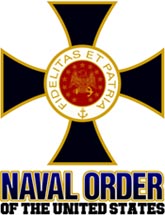


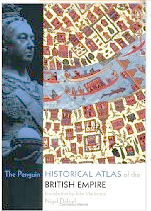
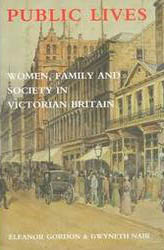

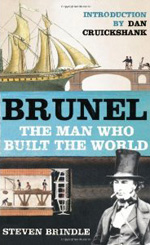


 Copyright ~ 1998-2018.
Copyright ~ 1998-2018. 